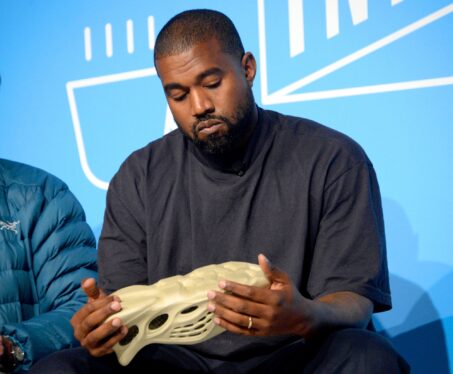Adidas AG is asking a federal judge to toss out a class-action lawsuit that claims the company violated securities laws by failing to warn its shareholders about Ye’s offensive behavior, calling the fraud case “misguided” and opportunistic.
Filed last year, the lawsuit claims Adidas knew about serious problems with Ye (formerly Kanye West) as far back as 2018. By failing to disclose such risks, the lawsuit claims, the company left investors facing losses when it finally ended the partnership in 2022 over Ye’s antisemitic tirades and erratic behavior.
But in a motion filed last week, attorneys for Adidas argue that the case should be dismissed immediately. They say the lawsuit’s allegations fall “far short” of securities fraud, and that federal law doesn’t permit investors to haul companies into court over “fraud by hindsight.”
“This lawsuit is a misguided attempt to transform the dramatic and unfortunate end of the commercial partnership between Adidas and Ye… into a claim for securities fraud,” Adidas’ attorneys write in the Feb 2 filing. “Plaintiff opportunistically takes those unfortunate events and asserts, without basis, that earlier statements by Adidas … were somehow fraudulent.”
Adidas ran a lucrative collaboration with Ye and his Yeezy apparel brand for nearly a decade. But the party ended in 2022, when the sneaker company (and many others) cut ties with the embattled rapper amid a wave of offensive statements he made about Jewish people. In an October 2022 statement announcing the split, Adidas said the rapper’s statements were “unacceptable, hateful and dangerous.”
It’s been a messy breakup for Adidas. The split contributed to a loss of $655 million in sales for the last three months of 2022 and left Adidas holding $1.3 billion worth of unsold Yeezys and facing tricky questions about how to dispose of them responsibly. Adidas also battled Ye in court over millions in company funds and disclosed that it was litigating other aspects of the divorce in private arbitration.
In May, a group of investors took Adidas to court over the breakup, arguing that Adidas executives had been aware for years of the potential harm that could come from the Ye partnership but had failed to publicly share such concerns with shareholders, as required by U.S. securities law.
In particular, the lawsuit cited a November 2022 Wall Street Journal article reporting that Adidas executives feared for years that the Yeezy relationship could “blow up at any moment.” The article reported that West had made antisemitic comments in front of Adidas staffers, including suggesting that an album be named after Adolf Hitler. The Journal story also highlighted a 2018 presentation to then-CEO Kasper Rørsted that detailed the risks of the arrangement and contemplated cutting ties with him.
But in last week’s motion to dismiss the lawsuit, Adidas’ attorneys sharply rejected that the company had misled investors.
Instead, Adidas’ lawyers said the company’s regulatory filings had clearly advised shareholders about the potential for Kanye-related problems, even if specific earlier incidents were not spelled out in detail. Those disclosure filings included language warning that “improper behavior” by “partners in the entertainment industry” could ultimately have a “negative spill-over effect on the company’s reputations,” leading to “higher costs or liabilities” and could even “disrupt business activities.”
A lawsuit claiming that such statements misled investors “turns the securities laws on their head,” the Adidas lawyers wrote.
“Adidas issued comprehensive risk disclosures in all of its annual reports from 2018 forward that expressly warned investors about numerous issues, including the potential negative impact of a creative partner’s inappropriate conduct — precisely what plaintiff alleges occurred with Ye in October 2022,” the Adidas lawyers wrote. “Although plaintiff alleges that Adidas knew of discrete instances of misconduct by Ye from years earlier, there is no legal obligation to accompany broad risk disclosures with a description of prior incidents of inappropriate behavior.”
Rather than showing that the company knew it was hiding information from investors, Adidas’ lawyers argue the internal wranglings over Ye’s behavior show that “Adidas believed it was successfully managing the sometimes difficult partnership with Yeezy.”
An attorney for the plaintiffs did not immediately return a request for comment on Adidas’ filing.



